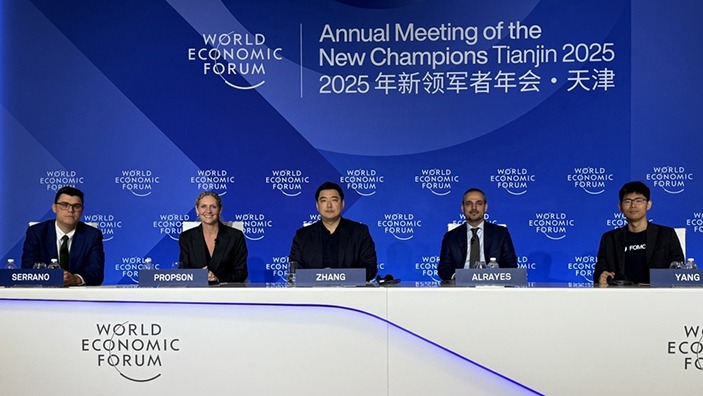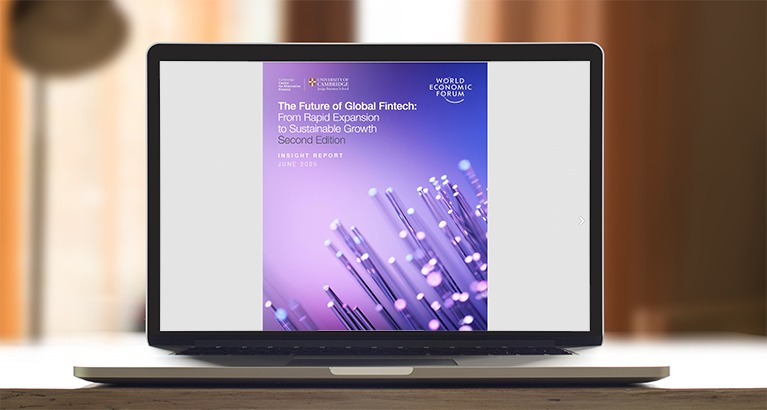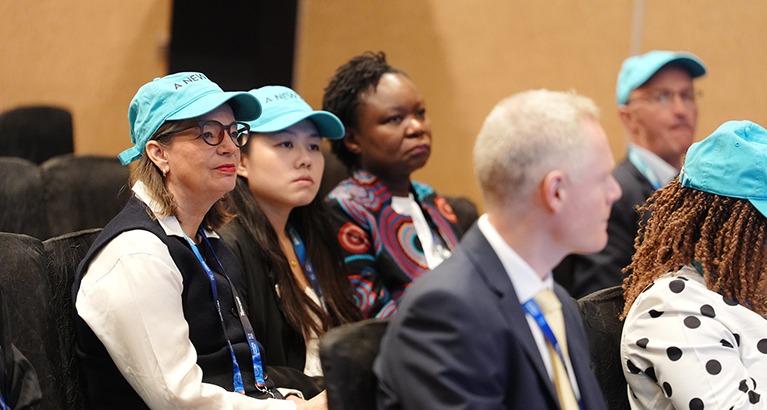Digital finance is at a pivotal juncture, transitioning from the rapid-fire expansion of recent years to a more measured, sustainable trajectory. In today’s global landscape, fintech firms are balancing the twin imperatives of scaling profitably and deepening their impact. New research from the Cambridge Centre for Alternative Finance (CCAF) at Cambridge Judge Business School, in partnership with the World Economic Forum, offers fresh insights into how 250 leading fintech companies are navigating macroeconomic headwinds, forging partnerships with incumbents, and leveraging AI to drive efficiency.
The second edition of the Future of Global Fintech report

This latest edition of the Future of Global Fintech report, co-published by CCAF and the World Economic Forum, uncovers not only a moderation in customer acquisition but also a remarkable resilience in revenue and profitability. More importantly, it highlights how fintechs are cementing their role as engines of inclusion – opening financial services to small businesses, underserved households, and women entrepreneurs across 6 regions. As industry and policy leaders prepared for the Annual Meeting of the New Champions 2025, these findings provide a data-driven roadmap for fostering the next phase of fintech growth: one that is sustainable, collaborative, and truly global.
Despite post-pandemic moderation, the fintech sector is showing strong, sustainable growth while reaching traditionally underserved groups. According to a new global survey of nearly 250 fintech firms, their customer growth now stands at 37%, down from 55% in the previous edition of the survey, however, financial performance remains strong with revenue growth at 40% and profit growth at 39%.
Carried out in collaboration with the Cambridge Centre for Alternative Finance (CCAF), at Cambridge Judge Business School, University of Cambridge, ‘The Future of Global Fintech: From Rapid Expansion to Sustainable Growth’ study also reveals the continued relevance of fintech’s role in expanding financial access to traditionally underserved market segments. A majority of surveyed firms report that micro, small and medium enterprises (MSMEs) (57%), low-income individuals (47%) and women (41%) constitute significant portions of their customer base. These populations, particularly in emerging markets and developing economies (EMDEs), are not only being reached but are also contributing meaningfully to fintechs’ bottom lines.
“Fintechs have embedded accessibility and reach into their business models, positioning themselves as essential players in creating a more equitable global financial system,” says Drew Propson, Head of Tech and Innovation in Financial Services, World Economic Forum. “These findings underscore fintech’s ability to help drive economic expansion, even as the sector adapts to more moderate post-pandemic growth trends.”
The study, covering 6 key fintech verticals across Asia-Pacific, Europe, Latin America and the Caribbean, the Middle East and North Africa, the US and Canada and Sub-Saharan Africa, also revealed the sector’s response to macroeconomic and funding trends, regulatory environments and opportunities to partner with traditional financial institutions, among other areas.
“Fintechs’ concerns on macroeconomic conditions and funding environment have eased but still linger on,” says Bryan Zhang, Co-Founder and Executive Director, Cambridge Centre for Alternative Finance. “However, coupled with more favourable regulatory conditions, ample opportunities to collaborate with incumbents and increasing adoption of AI in operations and business models, the growth perspective for fintechs remains promising.”
Fintechs’ concerns on macroeconomic conditions and funding environment have eased but still linger on, however, coupled with more favourable regulatory conditions, ample opportunities to collaborate with incumbents and increasing adoption of AI in operations and business models, the growth perspective for fintechs remains promising.
Growing economic optimism despite ongoing challenges
The report finds macroeconomic conditions remain the most cited challenge to growth, with 18% of respondents mentioning macroeconomic factors as a growth hindrance. However, this marks a notably more positive view compared to the 2024 edition of the survey where 56% of respondents viewed macroeconomic factors as a hindrance.
Similarly, concerns about the funding environment have eased significantly with only 12% now citing it as a hindrance, down from 40% in the previous edition. While this study finds a clear improvement in economic and funding environments, there is still more to be done to foster sustainable fintech growth, particularly in improving access to capital and enhancing regulatory efficiency.
Future priorities for fintech growth
Fintechs report their regulatory environment is generally suitable, with 62% of respondents stating that regulations in their regions are adequate and 35% citing strong regulatory clarity. Despite this, firms continue to highlight areas for improvement, including the capacity and coordination of financial authorities and efficiencies in licensing and registration processes.
The survey also reveals the importance of partnerships between fintechs and traditional financial institutions. An overwhelming 84% of fintechs report collaborating with incumbents, primarily through API integrations (52%), showing a symbiotic relationship between fintechs and traditional players, with fintech expected to integrate further into the broader financial ecosystem as the industry continues to evolve.
Looking ahead, priorities such as AI adoption and regional interoperability, along with positive fintech sentiment toward collaborations with incumbents, the regulatory landscape and funding environments, all signal a more integrated and resilient financial future. Regulators, policymakers, and business leaders can support this future and capture the related economic benefits of fintech growth by equipping themselves with data-driven research to respond effectively to emerging trends in the industry.
Survey context
The Future of Global Fintech 2025 report surveyed a total of 240 carefully selected fintech companies across 6 key retail facing fintech business verticals and 6 key regions
Retail facing fintech business verticals
- Digital lending
- Digital capital raising
- Digital payments
- Digital banking and savings
- Insurtech
- Wealthtech
Regions
- Asia-Pacific
- Europe
- Latin America and the Caribbean
- Middle East and North Africa
- The US and Canada
- Sub-Saharan Africa
Download the report
The Future of Global Fintech report, produced by CCAF in partnership with the World Economic Forum, highlights how fintech continues to expand financial access for traditionally underserved segments.
Related content
The 16th Annual Meeting of the New Champions takes place from 24 to 26 June 2025 in Tianjin, People’s Republic of China, under the theme ‘Entrepreneurship for a New Era’. The meeting convenes over 1,500 leaders from business, government, civil society, academia, international organisations, innovation and media to explore entrepreneurial solutions to global challenges.





